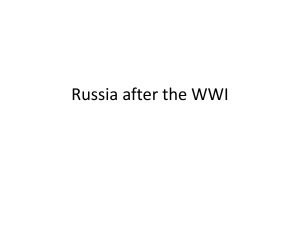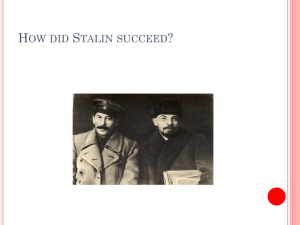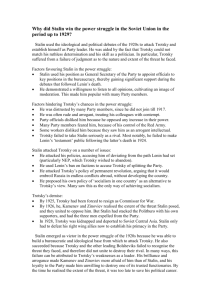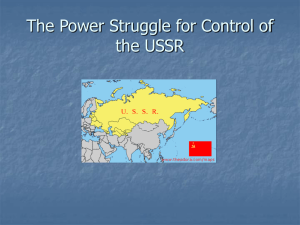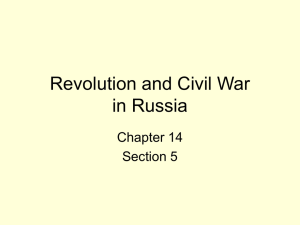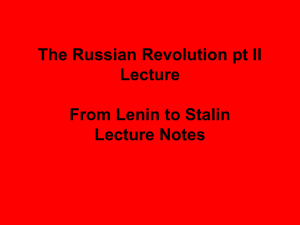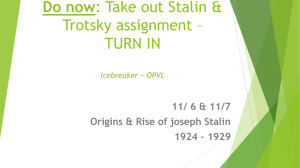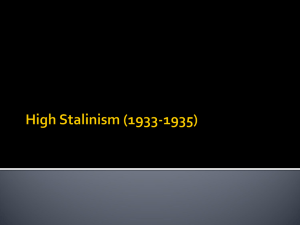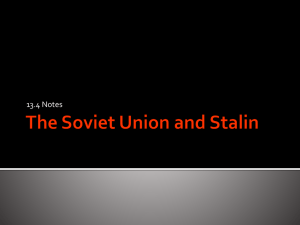REASONS FOR STALIN`S RISE TO POWER
advertisement
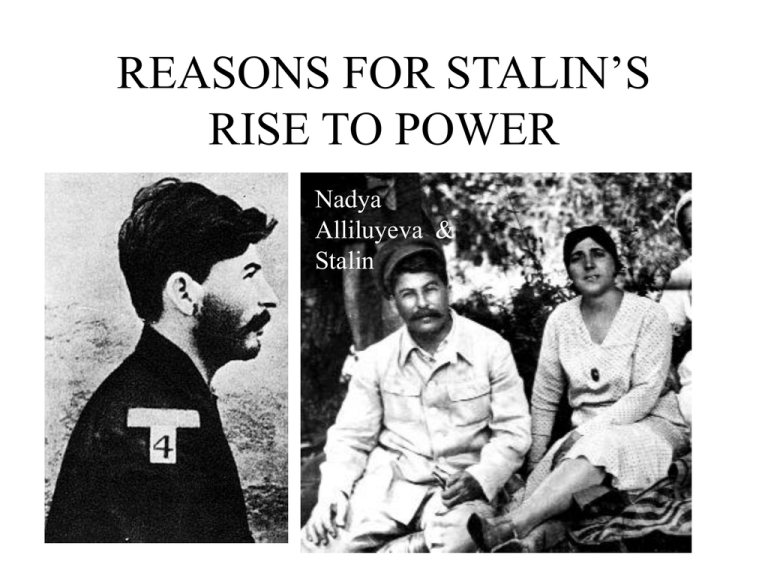
REASONS FOR STALIN’S RISE TO POWER Nadya Alliluyeva & Stalin Death of Stalin Obstacles/ Opposition to His Path A. Lenin’s Death & Will “Comrade Stalin, having become Secretary-General, has too much power in his hands; and I am not sure that he always knows how to use that power with sufficient caution. Stalin is too rude and this fault is insupportable in the office of Secretary General. Therefore I propose to the comrades to remove Stalin from the position and appoint another man who will in all respects differ from Stalin - more patient, more loyal, more polite and more attentive to comrades. Stalin and daughter Svetlina B. More Capable Communists Prominent Bolshevik revolutionaries are pictured centered around their leader, Vladimir I. Lenin, in a montage commemorating the Great October Revolution of 1917. The hammer and sickle of the new Soviet state are depicted at top. Top four left to right: Rykov, Radek, Pokrevsky, Kamenev. Middle Left to right: Trotsky, Lenin, Sverdlov. Bottom left to right: Bukharin, Zinoviev, Krylenko, Kollontai, Lunacharsky. Conspicuous by his absence in the early collection is Stalin Lev Trotsky - Menshevik turned Bolshevik - Lead role in 1917 Revolution & Russian Civil War - Brilliant writer and great public speaking skills Kamenev and wife (sister of Trotsky) - Member since 1903 - Lenin’s Deputy -Opposed Lenin on the timing of the October Revolution Leon Kamenev (1883-1936) - Member of Bolshevik party since 1903 - Trusted by Lenin - Good leadership and organizational skills - Opposed Lenin on the timing of the October Revolution Grigory Zinoviev (1883-1936). I. Letter and Testament was kept private - Lenin’s testament was mailed to the central committee by Kupskaya - Supposed to be read at the 13th Party Congress in late 1923. - Political statement not made public because all leaders were criticized On the other hand, C. Trotsky is perhaps the ablest person in the present Central Committee, but is too boastfully sure of himself and too carried away by the strictly administration side of things. Deathbed 1940 II. Pretended to be close to Lenin & acted weak - tricked Trotsky into missing Lenin’s funeral - Made it seem as if Trotsky was too proud. - Stalin made chief mourner - Kamenev and Ziniev moved to have Trotsky expelled - Stalin opposed - Trotsky lost his post of Revolutionary Military Council and Red Army - Removal of Tukhachevsky and appointment of Klim Voroshilov III. Used post of Secretary General - Controlled the whole central party machinery and local party committees - 15,000 functionaries. - Power to appoint local officials and inspect their work. - Increased his influence among the rank and file, especially provincial party positions - Eventually able to join forces with Bukharin to have Trotksy, Kamenev and Zinoviev expelled in 1927 Nicholay Bukharin and Maria Ilyinichna Ulyanova, the sister of Lenin, prominent members of the editorial staff of the Soviet journal Pravda at work IV. Called for Socialism Within One Country vs. World Revolution (Trotsky) V. Overconfidence of his rivals “We don’t like Stalin but we hate Trotsky more. Stalin is not so smart. We can easily defeat him. Trotsky is the real threat. He is arrogant and not interested in our opinions. Trotsky is so sure that he is always right. This is an insult to the other party members. We will support Stalin at the next party meeting” Kamenev to Zinoviev Trotsky sat through party meetings pointedly reading French novels instead of joining in the arguments between Zinoviev/Kamenev and Stalin 1879-1940 Trotsky’s expulsion. Arriving in Paris In October 1927, Trotsky and Zinoviev were expelled from the Central Committee. When the United Opposition tried to organize independent demonstrations commemorating the 10th anniversary of the Bolshevik seizure of power in November 1927, the demonstrators were dispersed by force . Their leading supporters, from Kamenev down, were expelled in December 1927, which paved the way for mass expulsions of rank and file oppositionists as well as internal exile of opposition leaders in early 1928. After 1928
